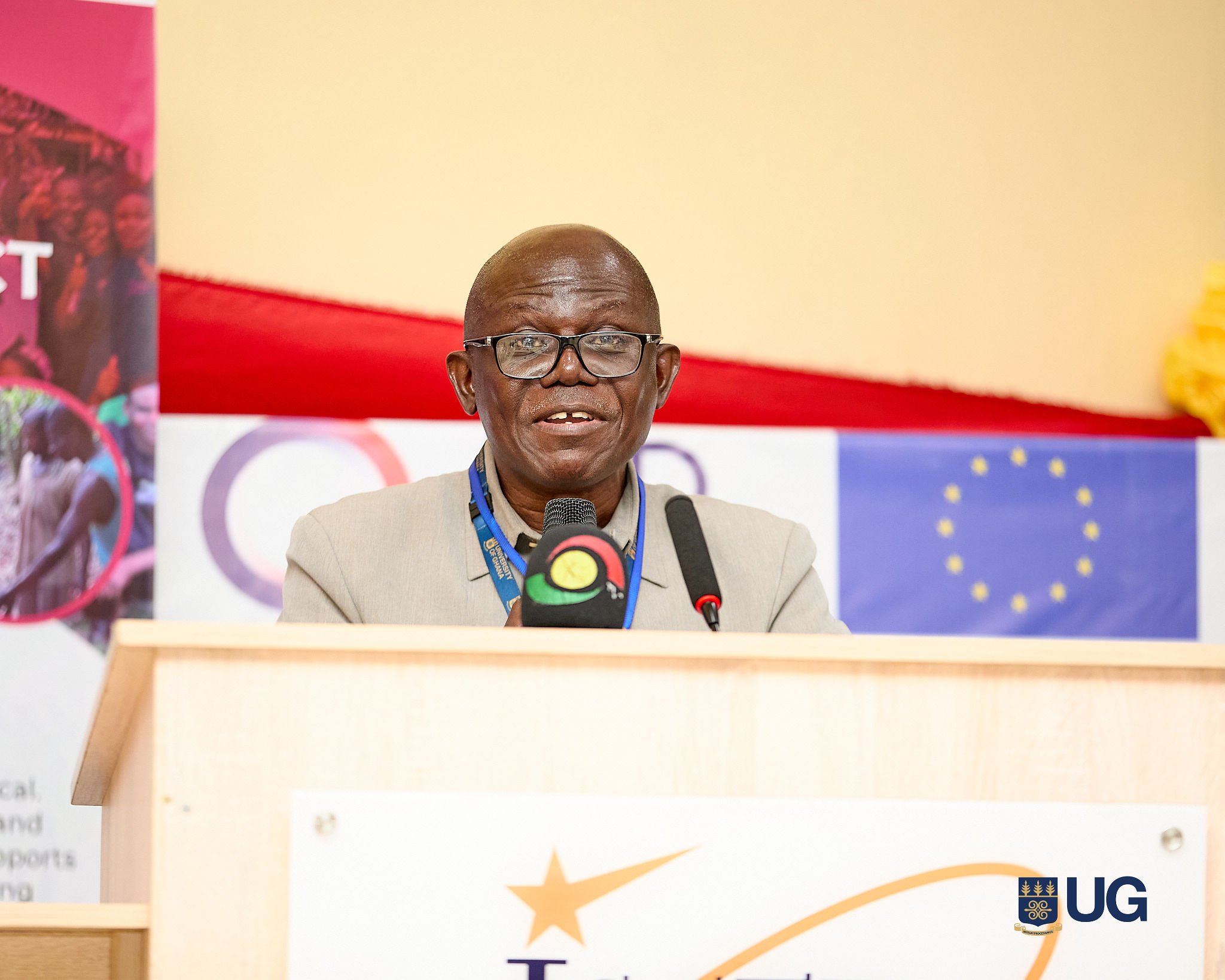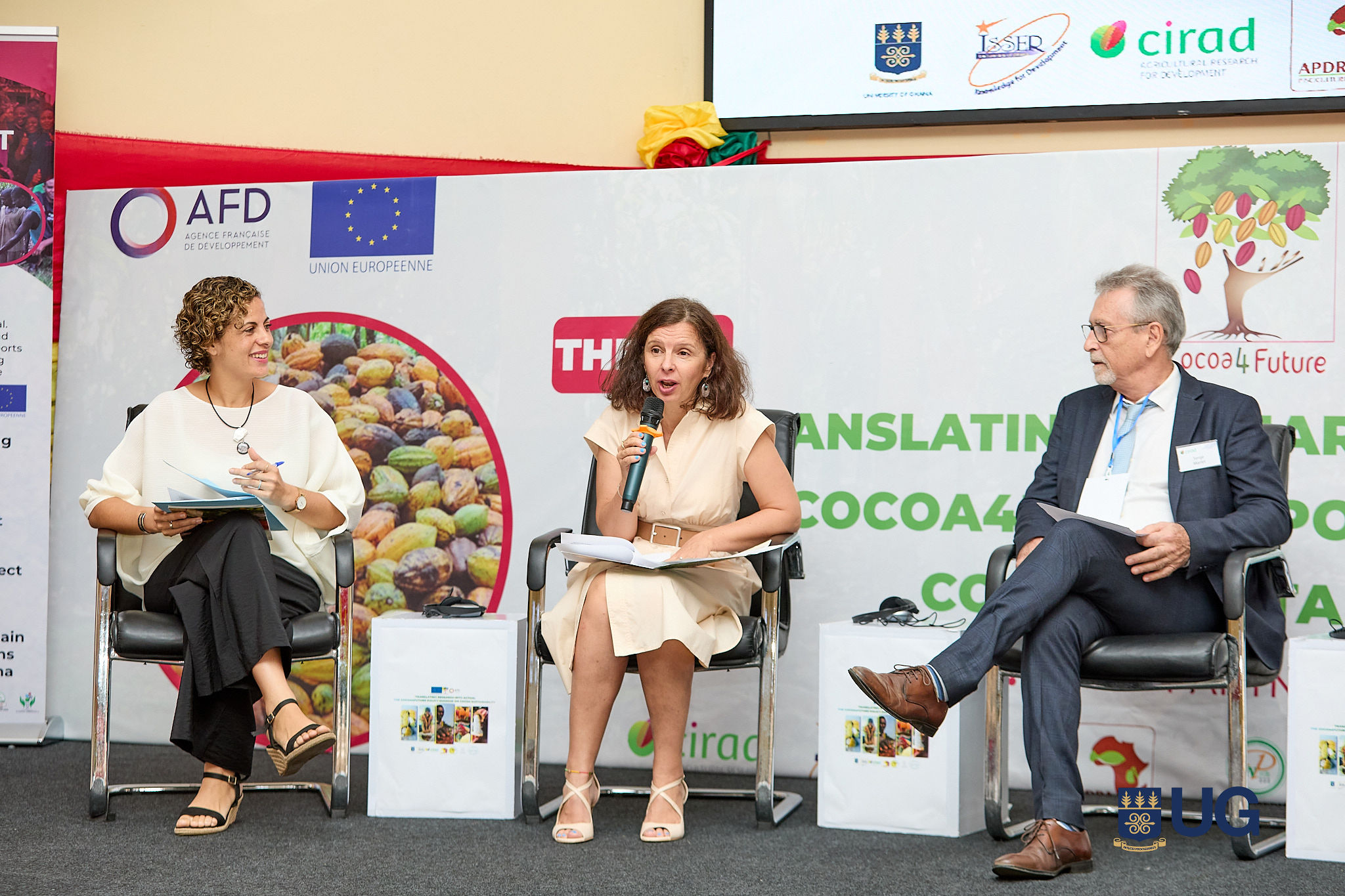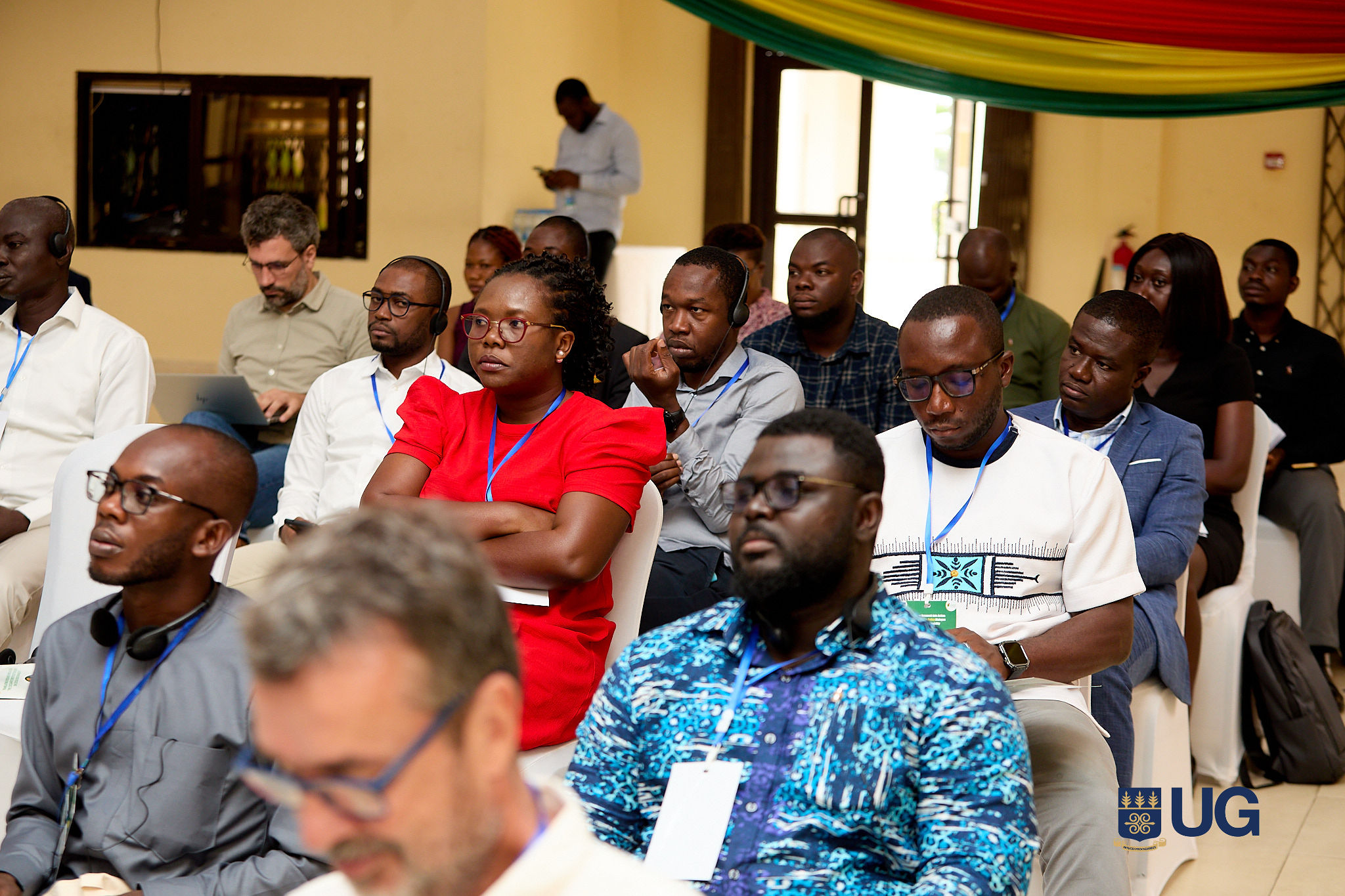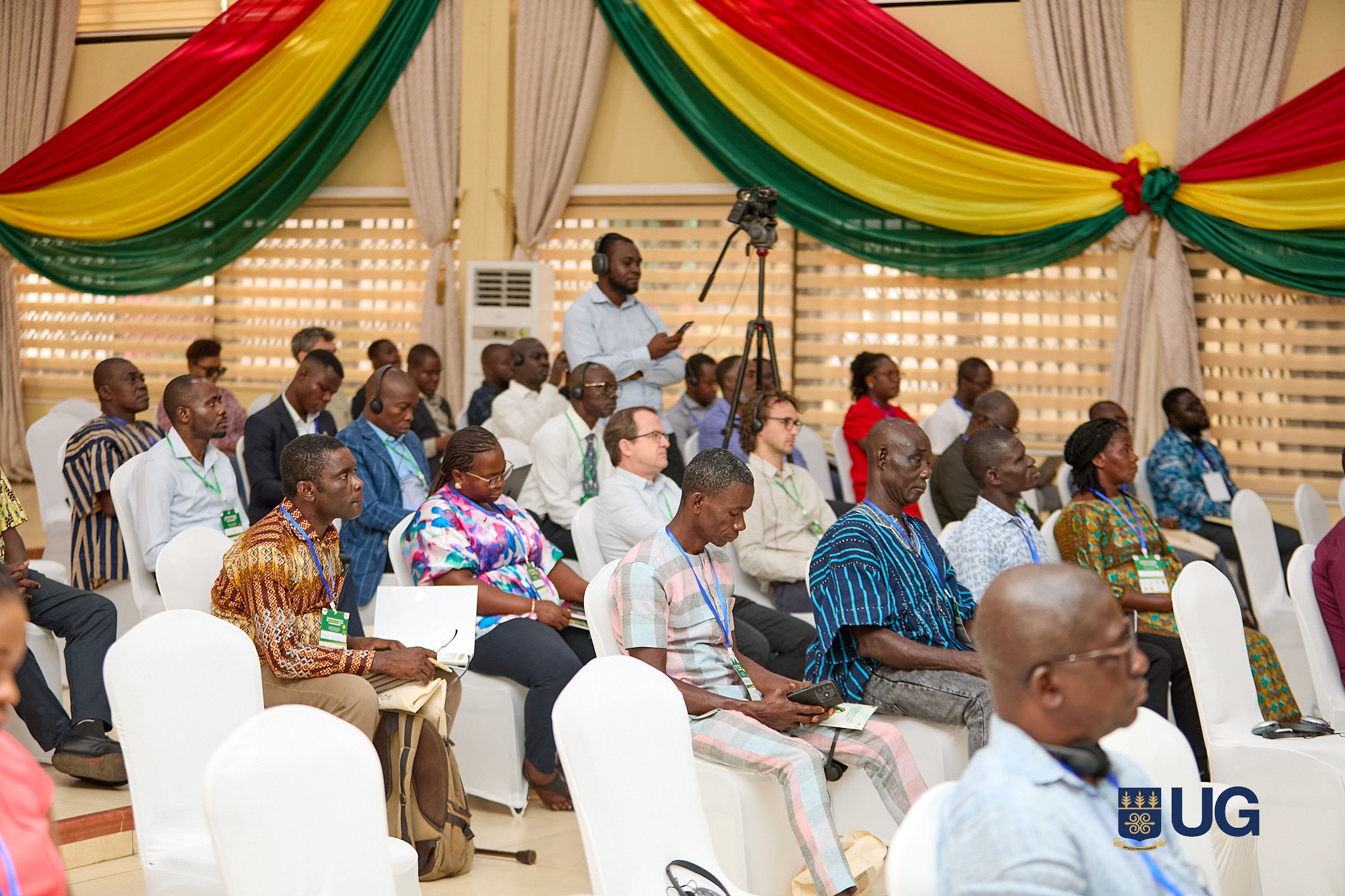Researchers Outline New Evidence on Cocoa Production and Sustainability at Cocoa4Future Dialogue

Researchers from the University of Ghana, CIRAD (Centre de coopération internationale en recherche agronomique pour le développement), the Cocoa Research Institute of Ghana (CRIG) and partner institutions in Côte d’Ivoire, have presented new evidence on cocoa production and sustainability. The evidence formed the basis of a policy dialogue convened to translate outcomes from the EU and AFD funded Cocoa4Future project into actionable measures for the cocoa sector.
The two-day meeting, held at the Institute of Statistical, Social and Economic Research (ISSER), brought together representatives from public institutions, farmer groups, international research organisations, the private sector and development partners to review research outcomes and co-develop recommendations for Ghana’s cocoa sector.
Opening the workshop, the Pro Vice-Chancellor for Research, Innovation and Development, Prof. Felix Ankomah Asante, highlighted the importance of evidence-based interventions in sustaining Ghana’s cocoa economy. He stated that the country’s reliance on cocoa makes it necessary to intensify research and investment, especially as recent figures indicate declining yields and output. He explained that research emerging from the Cocoa4Future project provides critical insights that can support more resilient production systems.

Prof. Asante also underscored the value of the project’s contribution to academic and professional capacity building. He said the training of PhD, Masters and MPhil students under the initiative strengthens national efforts to expand expertise in agricultural research and development. He expressed appreciation to project partners in Ghana and Côte d’Ivoire for their collaboration and indicated that the workshop creates an opportunity to review outcomes across the project cycle and translate them into actionable policy directions.
Addressing participants, Ms. Paulina Rozycka, Head of the Infrastructure and Sustainable Development Section of the European Union Delegation to Ghana, affirmed the EU’s commitment to supporting sustainable cocoa production. She said the knowledge generated under the Cocoa4Future project offers a strong basis for addressing challenges related to agroforestry, cocoa swollen shoot virus disease, certification systems and farmers’ livelihoods. According to her, the findings introduce new data that will guide ongoing reflections on sustainability within the sector.

Ms. Rozycka emphasised the need for continued collaboration between researchers, policymakers, private sector actors and local communities. She noted that sustainability depends on maintaining an active consultation framework and commended the University of Ghana, CIRAD and the Cocoa Research Institute of Ghana (CRIG) for their leadership in convening stakeholders to shape practical solutions. She acknowledged the presence of farmer groups and development partners, stating that their perspectives are essential in translating research into effective approaches.
The Country Director of the French Development Agency (AFD), Ms. Clémentine Dardy, and the Regional Director of CIRAD for West Africa, Dr. Serge Marlet, also delivered remarks. They highlighted the importance of coordinated efforts in implementing research-driven initiatives and noted that the findings emerging from the project reinforce the need for cross-country learning between Ghana and Côte d’Ivoire. Their statements pointed to the relevance of shared evidence in designing programmes that address long-standing production constraints.
Research findings presented at the workshop point to several issues affecting cocoa production and sustainability. Evidence from field studies shows that agroforestry systems improve soil quality, enhance resilience to climate stress and offer long-term benefits for farmers. Updated data on cocoa swollen shoot virus disease confirms that it remains a critical threat to productivity in Ghana, with recommendations pointing to more targeted surveillance and control measures.

Findings on certification and livelihoods indicate that while certification schemes provide benefits, farmers require broader support mechanisms, including fair pricing, access to credit and diversification opportunities. Socio-economic assessments also show that land tenure arrangements, labour availability and household dynamics significantly influence farmers’ ability to adopt improved practices.
The dialogue forms part of the Cocoa4Future project, a research and innovation initiative running from 2020 to 2026 and funded by the European Union and the Agence Française de Développement (AFD). Implemented by the University of Ghana, CIRAD and CRIG, with partners in Côte d’Ivoire, the project promotes sustainable agroforestry cocoa systems and supports improved socio-economic practices along the cocoa value chain. Over the past five years, the project has generated substantial research findings that are being shared during the workshop to inform policy development.
The Cocoa4Future project is implemented by a broad consortium of partners from Ghana and Côte d’Ivoire, including CIRAD and eight EU-recognised co-participant institutions comprising 14 entities such as Université Félix Houphouët-Boigny, INP-Houphouët-Boigny, Université Jean Lorougnon Guédé, Université Nangui Abrogoua, Nitidæ and APDRA, with the University of Ghana’s School of Agriculture and ISSER also playing key roles. The Cocoa Research Institute of Ghana (CRIG) later joined the consortium as an additional co-participant, working alongside CIRAD’s specialised research units including ABSys, Forests and Societies, PHIM, ArtDev, Innovation, QualiSud and ISEM, with AMAP and CBGP providing further scientific support.

The meeting featured presentations, group discussions and roundtable engagements, with participants expected to produce a policy brief on cocoa sustainability in Ghana. The workshop serves as a major platform for aligning scientific evidence with national priorities and advancing efforts to strengthen the future of cocoa production.
